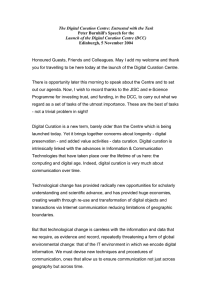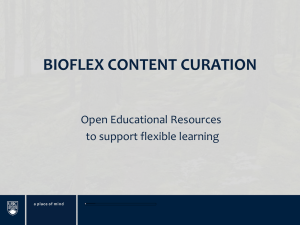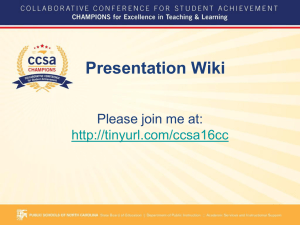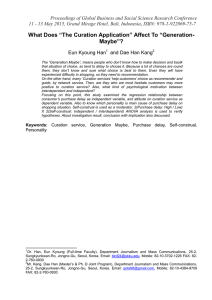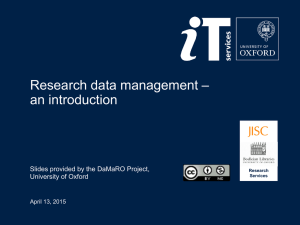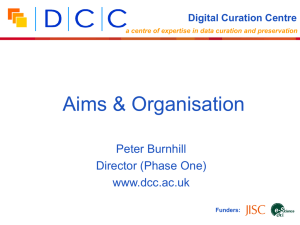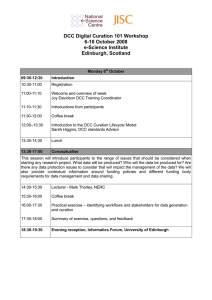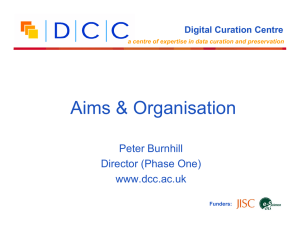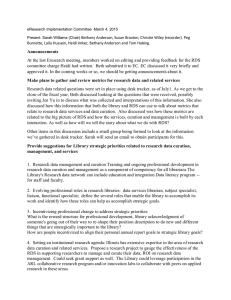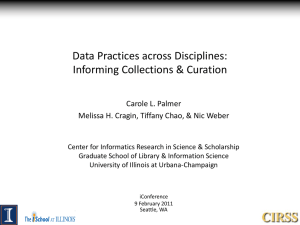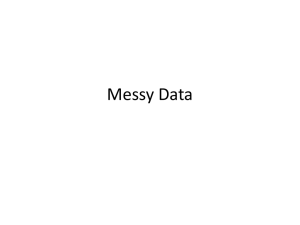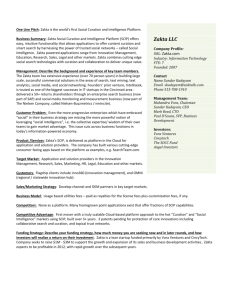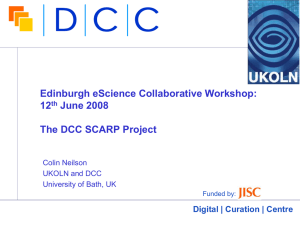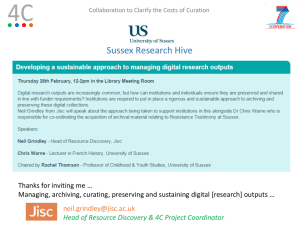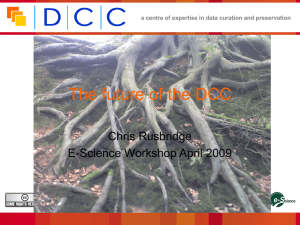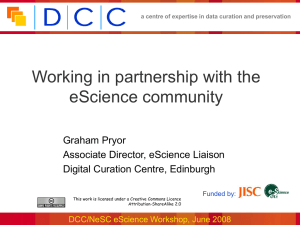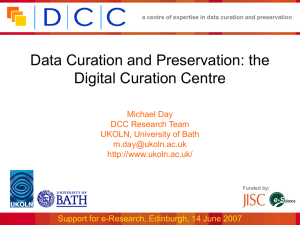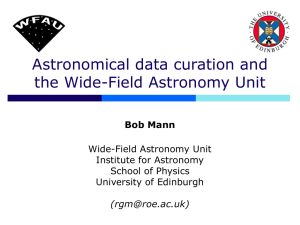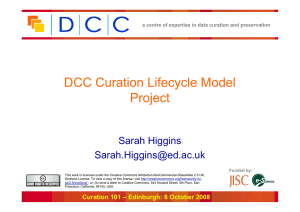Speech for the Principal of Glasgow (5-7 minutes)
advertisement
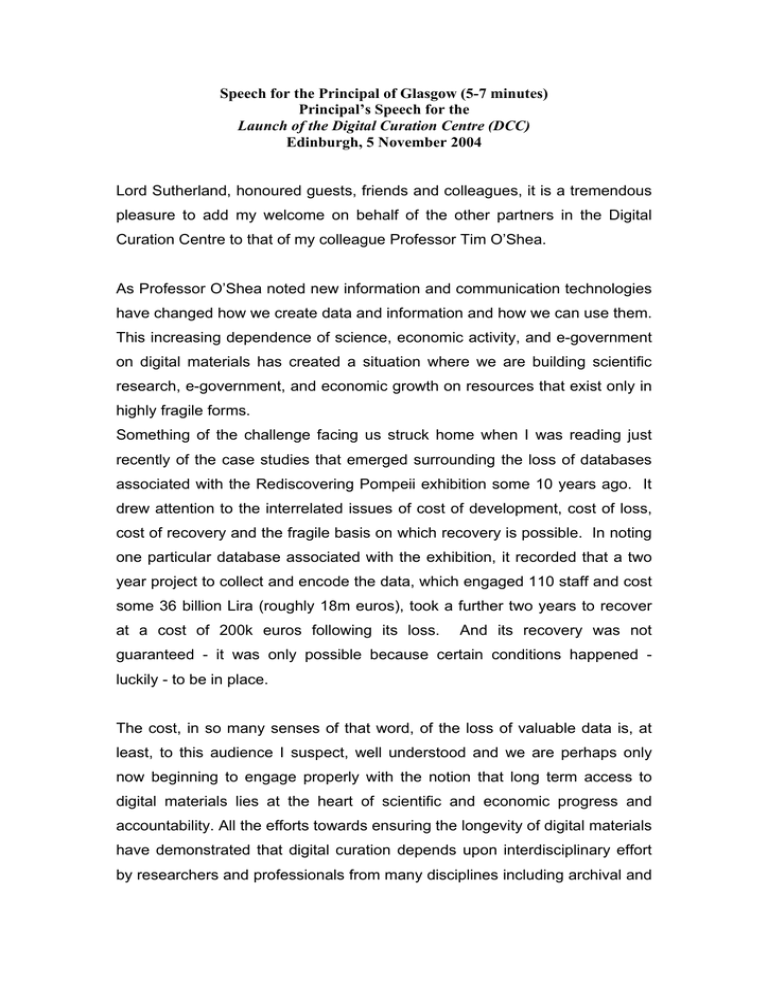
Speech for the Principal of Glasgow (5-7 minutes) Principal’s Speech for the Launch of the Digital Curation Centre (DCC) Edinburgh, 5 November 2004 Lord Sutherland, honoured guests, friends and colleagues, it is a tremendous pleasure to add my welcome on behalf of the other partners in the Digital Curation Centre to that of my colleague Professor Tim O’Shea. As Professor O’Shea noted new information and communication technologies have changed how we create data and information and how we can use them. This increasing dependence of science, economic activity, and e-government on digital materials has created a situation where we are building scientific research, e-government, and economic growth on resources that exist only in highly fragile forms. Something of the challenge facing us struck home when I was reading just recently of the case studies that emerged surrounding the loss of databases associated with the Rediscovering Pompeii exhibition some 10 years ago. It drew attention to the interrelated issues of cost of development, cost of loss, cost of recovery and the fragile basis on which recovery is possible. In noting one particular database associated with the exhibition, it recorded that a two year project to collect and encode the data, which engaged 110 staff and cost some 36 billion Lira (roughly 18m euros), took a further two years to recover at a cost of 200k euros following its loss. And its recovery was not guaranteed - it was only possible because certain conditions happened luckily - to be in place. The cost, in so many senses of that word, of the loss of valuable data is, at least, to this audience I suspect, well understood and we are perhaps only now beginning to engage properly with the notion that long term access to digital materials lies at the heart of scientific and economic progress and accountability. All the efforts towards ensuring the longevity of digital materials have demonstrated that digital curation depends upon interdisciplinary effort by researchers and professionals from many disciplines including archival and library science, computing science, and engineering. Collaboration lies at the core. The primary partners in the Digital Curation Centre, the Universities of Edinburgh and Glasgow, which together host the National e-Science Centre (NeSC), the Council for the Central Laboratory of the Research Councils (CCLRC), which operate the Rutherford and Daresbury Laboratories, and UKOLN, based at the University of Bath all recognise the need for shared vision and collaborative activity in the area of digital curation. These partners through their research, partnerships with other institutions, and activities have demonstrated that they have the expertise and skills to contribute innovative approaches to addressing the digital curation challenges. We appreciate the Joint Information Systems Committee, commonly known as the JISC, and the United Kingdom’s e-Science Programme for placing their trust and aspirations in this collaborative grouping by investing in the DCC as focus of activity in research, development, service, and community building in the area of digital curation. Other projects in this area, such as the Glasgow-led ERPANET Project, have found that the growing community of academics and professionals in the area of digital preservation and management are hungry for the results of research and development and new services. Most importantly, this community of researchers and specialists are eager to contribute to collaborative efforts to create the necessary R&D and communities of action essential if we are to secure and maximise our investment content creation in the digital age. In this regard it is my view that a core strength in the design of the Digital Curation Centre is the conduit it has created between its four core partners and the wider community through its Network of Associates. This federation of organisations engaged in research, data management, and standards development drawn from the research, commercial, and industrial sectors here in Britain and overseas will play a crucial role in the work of the Digital Curation Centre. The future of scholarship, industrial and scientific development, egovernment, and the quality of life of citizens depends upon how we secure, manage, and make reuseable the digital content that we are creating. It is this intellectual capital that will prove to be the renewable resource that will fuel the economic and intellectual growth of the 21st century. BUT, in common with all renewable resources its viability and value depends upon how we curate it. I acknowledge that, curation problems are hard and that we need original research and innovative developments if we are to meet these challenges. The collaborative vision and efforts of the core DCC partners and the participants in its network of associates will help to create the knowledge, expertise, and action that we need to ensure that the intellectual capital of the 21st century is renewable and accessible for future generations. I would like to join you in thanking the JISC and the e-Science Programme for the support they have provided to the Digital Curation Centre to support developments and progress on these challenges and I would wish the core team from Edinburgh, Glasgow, Bath and the CCLRC every success in the efforts they are leading. Sir Muir Russell Principal of Glasgow University 5 November 2005
